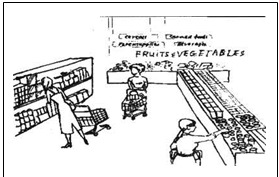题目内容
第二节 完形填空(共20小题,每小题1.5分,满分30分)
Be careful of those who use the truth to deceive (cheat). When someone tells you something that is true, but 36 important information that should be included, he can create a false 37 .
For Example, a man once told me, “I just won a hundred dollars on the 38 . It was great. I 39 that ticket back to the store and turned it in 40 one hundred dollars!”
This guy is a winner, right? May be, may be not. Then 41 I discovered that he bought two hundred tickets, and only one was a 42 . He was 43 a big loser!
He didn’t say anything that was false, 44 he left out important information 45 . That’s called a half—truth. Half—truths are not technically 46 , but they are just as dishonest.
Untrustworthy candidates in political campaigns often use this 47 . Let’s say that during Governor Smith’s last term, her 48 lost one million jobs and gained three million jobs. Then she sought another 49 . One of her opponents put an ad saying, “During Governor Smith’s term, the state lost one million jobs!” That’s 50 . However, an honest statement would have been quite different.
Advertisers will sometimes use half—truths. It’s 51 the law to make false claims, so they 52 to mislead you with the truth. An ad 53 blow its own horn, “Nine out of ten doctors lend Yucky Pills to cure nose pimples.” It fails to mention that they only ask ten 54 , and nine of them work for the Yucky Corporation.
This kind of 55 deception happens too often. It’s a fact of life: lies are lies, but sometimes the truth can lie as well.
36. A. makes out B. leaves out C. tries out D. puts out
37. A. chance B. expression C. impression D. translation
38. A. spot B. lab C. competition D. lottery
39. A. took B. turned C. went D. looked
40. A. with B. as C. like D. for
41. A. later B. formerly C. hardly D. generally
42. A. loser B. winner C. shame D. surprise
43. A. wrongly B. usually C. really D. right
44. A. since B. what’s more C. therefore D. but
45. A. on purpose B. by accident C. in time D. at first sight
46. A. chats B. lies C. failures D. consequences
47. A. fair B. court C. trick D. entry
48. A. company B. fellow C. country D. state
49. A. term B. cooperation C. election D. service
50. A. boring B. shocking C. true D. wrong
51. A. for B. against C. through D. across
52. A. regret B. forget C. fail D. try
53. A. must B. need C. should D. might
54. A. customers B. patients C. reporters D. doctors
55. A. attractive B. critical C. fair D. Sad
36—40 B C D A D 41—45 A B C D A 46—50 B C D A C 51—55 B D D D D
略

练习册系列答案
相关题目

 You push a shopping cart and put your food in it.
You push a shopping cart and put your food in it.